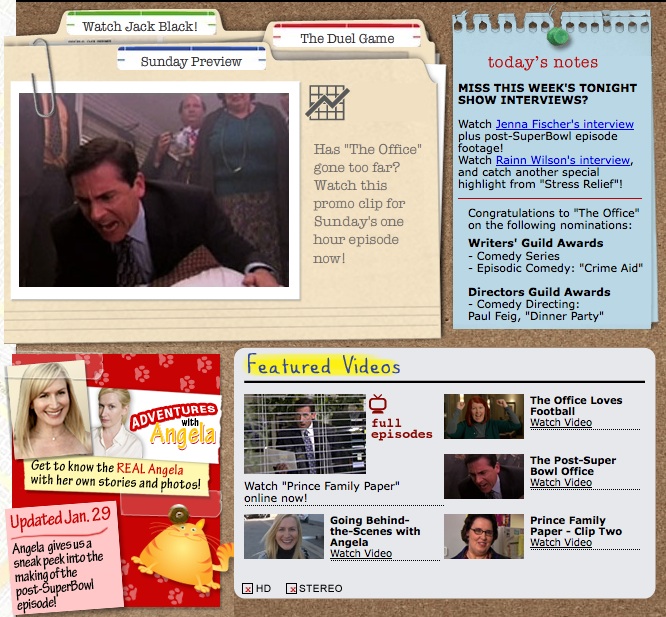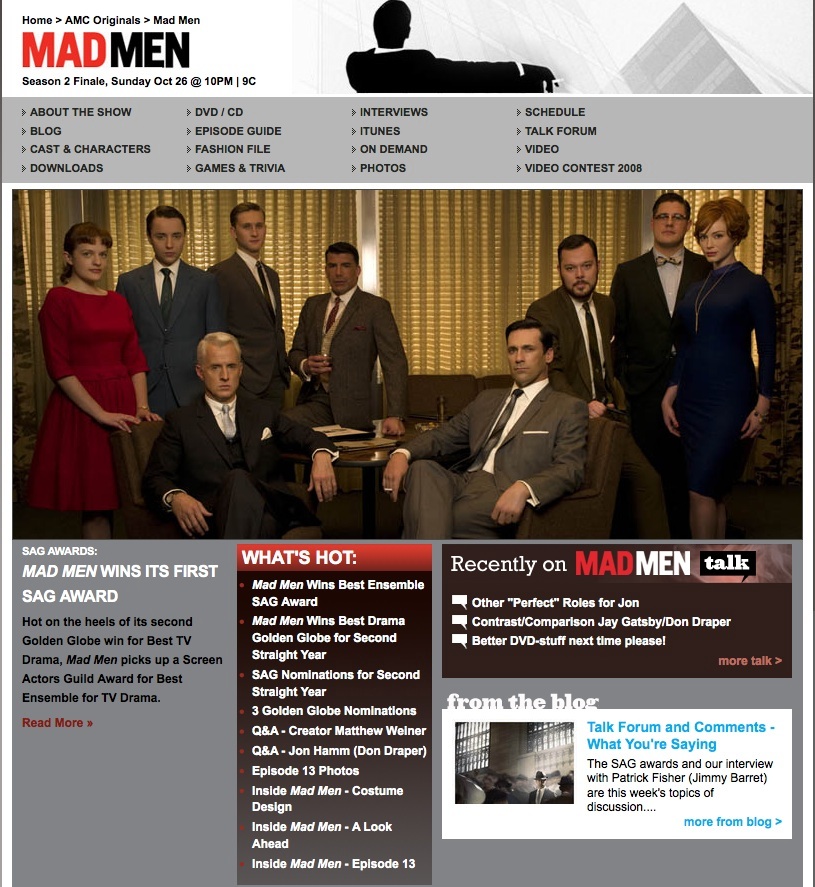
Good questions. I’m glad I asked them. Here are four important things the web should be doing for your series:
1. Attracting attention
2. Engaging your audience
3. Building a community
4. Getting the community to spreading the word about the show.
TV series need promotion. We rarely find new shows to watch by flipping around anymore. We find our shows because we hear about them and then check them out. Sometimes we hear about them through the critics, see a photo on the cover of a TV magazine, maybe there’s some buzz in the media or a TV ad catches our eye. The web is a great way to attract new viewers.
One of the things the web is really good at is spreading ideas, information and news. So if you have a show and want to get the word out about it, the web is a good way. Denis has a great example on his blog of a new British series, Being Human, that built a buzz well in advance of airing. Being Erica with it’s pre-premiere video blog is another good example.
Your audience only watches the show for a finite amount of time each week. Between episodes, your web presence can keep them thinking about the show. During hiatuses and between seasons it can help you ensure that your fans stay fans.
You can give your audience opportunities to connect with our fans and share their enthusiasm for the show. Fans who are connected to each other are a community and a community can turn into a powerful advocate for your show.

These are the things your series’ web presence can and should do for you. Unfortunately, very few series websites are doing the job — partly because they are created without clear goals in mind and partly because the web is a new medium with a culture all its own that you have to understand in order to use it effectively. So filling up some web real estate won’t do the trick. Setting up a web site or a Facebook fan page is a start, but by no means enough.
Get this through your head: there’s no such thing as viral video. A video doesn’t catch a germ and go haywire. That’s not something that just happens. It takes a lot of effort. And maybe some money.
The same holds true for engagement. Just offering a forum on your web site doesn’t mean people are going to flock to and leave lots of posts. You have to start the conversation and keep it going.
By the same token, having a Twitter account doesn’t mean anyone is going to follow it and even if you do get some followers, it doesn’t mean they’ll click on your links when you post them. You have to have a body of tweets that are of value to others to earn some twespect before your followers will really start interacting with you.
On the other hand, the digital component of a TV property doesn’t have to be mammoth, immersive or vastly expensive. It doesn’t need to be a game or an ARG or a virtual world. It can be quite simple and involve very little programming and still be effective. Nor do you necessarily have to create a whole bunch of original content for it. You do have to create some but there is plenty of material that you already have by virtue of developing and producing a television series that will work very well on the web.
First you have to understand that being on the web to monitor your web arm and to connect with a wide variety of people is a very important part of make the web work for you. That person one who has the authority to speak for the show, needs to be online on a daily basis and has to understand how to build virtual relationships.
The biggest mistake nubies make is thinking they can throw up content and everyone will look at it. Not so. If you want others on the web to listen to you, you have to listen to them. That’s called making friends and it is not a one-way activity. You wouldn’t just talk about yourself at a dinner party without asking the other people about themselves. And that goes double for the web.
Read blogs and leave comments. Reply to other people’s tweets. Write on your friends’ walls on Facebook. INTERACT.
Of course don’t to it just at random. Find your community on the web. You know what demographic the show targets, hand out on the web where your potential audience does. Find the popular bloggers, websites, Facebook groups they frequent and get to know the people.
If you’re interested in them, chances are they’ll start to be interested back. And when you tell them about your show, they’ll want to check it out.
Some of them will visit the website and that gives you even more chance to get them to watch the show. At the same time, the website should service the people already watching. How can it do that?

Content. People who like the show come to your site to get both basic information (like what time its on and on what channel) and find out more than what’s offered in the weekly episodes. Give them some behind the scenes information, news about the show, creators and cast, biographies of the characters. Throw in some photos, a podcast or two and some exclusive web video and you’re really cooking. Check out the websites for MadMen and Skins. They offer tons of extras for the dedicated fan.
Now that you’ve got some fans, how do you keep them engaged with the show and the site? Give your fans news first. Get a pickup? Cast someone cool as a guest star? Shoot in an amazing location? Tell your web fans. They’ll love the insider info.
Make sure there’s stuff that they can take from your site and spread around the internet. Provide video clips that are embeddable elsewhere. Create badges and widgets that they can put on their blogs. Upload photos they can use on their Facebook profiles.
There is no question that the time to start working on this is in development, not after production is wrapped and you’re getting ready to launch. You must start working on this early. Now maybe.

Shekki
BeingErica.ca was produced by Fuel Industries )
Jason Sanders
I can’t stress the importance of embeddable content enough. The web already has too many walled gardens, why not put the ability to promote your show in the hands of your fans?
Great post, Jill.
Robert Pincombe
All the basics are here for the taking. People are so obsessed with new technologies and cool ideas I often can’t even load the frickin’ site! You can do so much with the basics. But you’re right about needing a constant presence. It’s got to feel LIVE like radio. People need to know someone’s there checking up on them every day. LIVE and ALIVE. Digital gardens need tending.
admin
Digital gardens need tending… good point, Robert.
Ditto for the importance of embeddable content, Jason. I understand that there are sometimes rights issues involved but we have to get past them. Embeddable is second only to interaction.
And human style interaction — commenting and making friends is way more important that simulations and game play. I think anyway.
And Shekki, thanks for the ad for Fuel Industries. Nice to have a little product placement here, I just wish some money were changing hands.
Sean Howard
Congrats. I pray many people in “TV land” hear what you are saying and pay it heed. Love the work on the characters by “Being Human.” The mini-dramas (backgrounds) were brilliant and made me want to watch the show!
Ted
Good stuff Jill!
The human element is often lacking from tv sites. Broadcasters are not used to allowing people to see unfinished content, or engage in the process. It’s hard for them to change their ways.
But what a way to build loyalty with your fans. Treat them with respect & intelligence.
Oops – I used the “I” word.
Elize Morgan
Too true. Brilliant post, Jill, and bang on. I think people get wrapped up in thinking it has to be crazy big to be good – even ARGs don’t have to be as big as say, the Beast (42 Ent) was.
Lorin Wertheimer
Ack! Jill, I wish you had posted this a year ago. Or, I wish I had read this a year ago. I am having so much trouble with all this stuff.
I do like your suggestions, and I will study the websites you mention. And although I have been doing some work along these lines, I can be doing a lot more.
One thought: I’ve been told that it helps to give bloggers that you have a relationship with extra information in advance of a launch. In my case, I didn’t have a relationship with any bloggers ahead of time, so I was unable to follow this advice, but it seems sound.
Thanks for the great post!